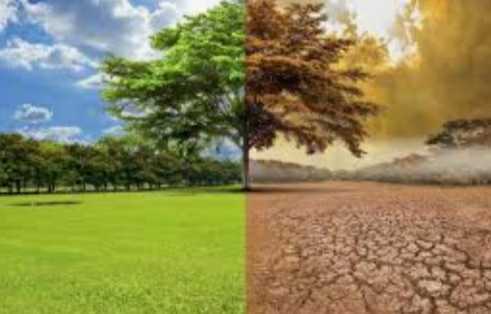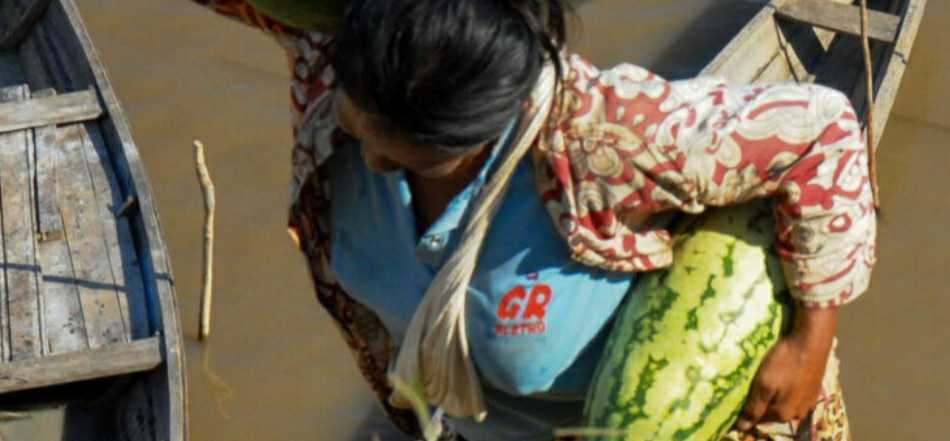
Bridgetown, Barbados, December 1, 2020 (PAHO) – International, regional, and government leaders announced the launch of a broad-based project to support actions to mitigate climate change and its serious health impacts in Caribbean nations. The EU/CARIFORUM Strengthening Climate Resilient Health Systems Project – a joint project of the European Union and CARICOM that PAHO is coordinating – will advance public understanding of climate change effects and strengthen the ability of health systems to respond to climate-related health impacts.
“We are at a crucial point in time in the Americas when we must increase our solidarity and inter-governmental collaboration to address climate issues, which are arguably the health challenges of the century,” said PAHO Director Carissa F. Etienne. “The Americas must embrace mechanisms for countries to come together around climate change.”
“The project supports a cadre of new climate and health leaders,” Etienne continued. “It promotes evidence for the frequently hidden health co-benefits of climate action and supports the implementation of health-related plans and resources for mitigation and adaptation for health.”
She said the EU/CARIFORUM Climate Change and Health Project will also assist regional nations in accessing funding for coping with climate change.
The Tuesday virtual meeting was attended by leading representatives of governments and organizations that are partners in the €6.85 million (USD $8.28 million) project, including Etienne, Secretary General of CARICOM, Irwin LaRocque, Dominica’s Minister of Health, Dr. Irving McIntyre, and Head of Delegation of the European Union to Barbados, The Eastern Caribbean States, OECS and CARICOM/CARIFORUM, Malgorzata Wasilewska. Partners in the project also include Caribbean universities, and regional climate, public health and agricultural agencies and organizations.
The beneficiary countries are Antigua and Barbuda, Bahamas, Barbados, Belize, Cuba, Dominica, Dominican Republic, Grenada, Guyana, Haiti, Jamaica, St. Kitts and Nevis, St. Lucia, St. Vincent and the Grenadines, Suriname, and Trinidad and Tobago.
“The WHO says that between 2030 and 2050, climate change is expected to cause approximately 250,000 additional deaths per year, from malnutrition, malaria, diarrhea and heat stress,” said LaRocque. “The direct cost to health is estimated to be between $2 to $4 billion per year by 2030. Tellingly, areas with weak health infrastructure, mostly in developing countries, will be the least able to cope without assistance to prepare and respond.”
He asserted that in order to respond to climate change, CARICOM’s member states must have access to concessional development financing, or soft loans, with more generous terms than market loans. He added that financing should be based on the universal vulnerability index, which measures the exposure of populations to hazard.
Etienne said that PAHO would also work to assist Caribbean nations in getting financial assistance. She said that PAHO will do so through the Green Climate Fund, which was established to help developing nations respond to climate change.
Ambassador Malgorzata Wasilewska, affirmed the European Union’s pleasure and privilege to continue its partnership with regional agencies, building on a diverse portfolio of programmes, to support advancement in the health and climate sectors.
“We recognise that the One Health approach to this new initiative will further strengthen the regional partnership with the European Union as it is aligned with both the EU Health Strategy and the EU Strategy on Adaptation to Climate Change…The European Union is privileged to continue our partnership with an esteemed group of regional agencies that builds on a diverse portfolio of programmes, to support advancement in the health and climate sectors,” Ambassador Wasilewska noted.
Minister of Health for Dominica Irving McIntyre said that his country has felt the effects of climate change first-hand and as a result aims to become the region’s first climate resilient nation by 2030.
“While we have been calling on the developed countries to change their habits, we have been doing what we can to build resilience in our country,” he said. “The government of Dominica has directed investments towards economic transition and recovery efforts. We are well on our way to achieving resilience in terms of infrastructure, economy and fiscal policies, and resilience in our health and education system.”
He pointed out key actions by his country such as the formalization of the Climate Resilience Execution Agency of Dominica, which took place shortly after Hurricane Maria. The agency works to incorporate resilience into all aspects of society. He also pointed out the island’s 7-Megawatt geothermal plant and the Building Back Better initiative to help residents rehabilitate, rebuild or design homes to be both energy-efficient and resilient, the 2019 plastic ban, and the SMART Hospital program, which focuses on improving hospitals’ resilience. The hospital project was funded through the United Kingdom’s Foreign Commonwealth & Development Office and led by PAHO.
The Pan American Health Organization (PAHO) works with the countries of the Americas to improve the health and quality of life of its population. Founded in 1902, it is the world’s oldest international public health agency. It serves as the Regional Office of WHO for the Americas and is the specialized health agency of the Inter-American system.
LINKS
Please see the speeches here/ Recording of the event – Spanish (https://youtu.be/lPHmsdPdt5o); English (https://youtu.be/_ngVi8iNQKw); Floor audio (https://youtu.be/9nQXgagraaw)






